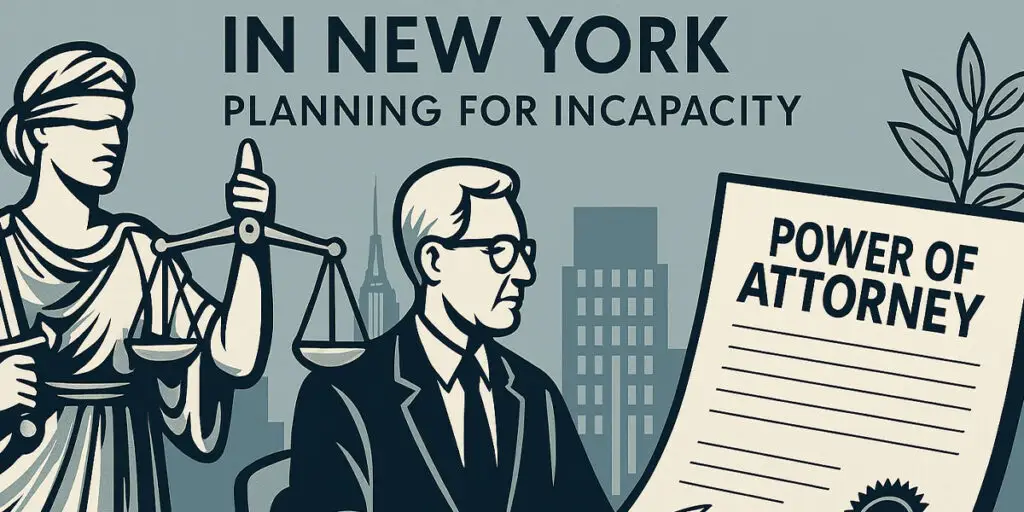Powers of Attorney in New York: Planning for Incapacity and Protecting Your Future
Life is unpredictable, and planning for the unexpected is a responsible and prudent step to protect yourself and your loved ones. One of the most important tools for preparing for the future is a power of attorney. A power of attorney is a legal document that allows you to appoint someone you trust (your agent) to make decisions on your behalf if you become unable to do so. This can happen due to illness, injury, or any other condition that impairs your ability to communicate or make informed decisions. At Morgan Legal Group, serving New York City and beyond, we help individuals and families create comprehensive estate plans that include powers of attorney to address potential incapacity. This comprehensive guide will explore the different types of powers of attorney in New York, their benefits, and how to create one that meets your specific needs and protects your future. Preparing for the unexpected is a gift to yourself and your family.
What is a Power of Attorney?
A power of attorney is a legal document that grants another person the authority to act on your behalf. The person granting the authority is known as the principal, and the person receiving the authority is known as the agent or attorney-in-fact. A power of attorney can be used to delegate a wide range of powers, including financial, legal, and healthcare decisions. A well-drafted power of attorney ensures your affairs can be managed even if you are unable to do so yourself. The key is to select a trustworthy agent and clearly define their authority.
It is important to note that a power of attorney is only effective while the principal is alive. Upon the principal’s death, the power of attorney terminates, and the authority to manage the estate passes to the executor or administrator. Therefore, a power of attorney is a tool for managing your affairs during your lifetime, not for distributing your assets after your death.
Types of Powers of Attorney in New York
New York law recognizes several types of powers of attorney, each designed to address different needs and circumstances. The most common types include:
- Durable Power of Attorney: This type of power of attorney remains in effect even if you become incapacitated. It is the most common type of power of attorney used for incapacity planning.
- Non-Durable Power of Attorney: This type of power of attorney terminates if you become incapacitated. It is typically used for specific transactions or for a limited period of time.
- Springing Power of Attorney: This type of power of attorney only goes into effect upon the occurrence of a specific event, such as your incapacity.
- General Power of Attorney: This type of power of attorney grants your agent broad authority to act on your behalf.
- Limited Power of Attorney: This type of power of attorney grants your agent specific authority to act on your behalf, such as to sell a particular piece of property.
The choice of which type of power of attorney is right for you will depend on your individual circumstances and goals. An experienced attorney can help you evaluate your options and create a power of attorney that meets your specific needs. Careful consideration of your situation is essential for making the right choice.
Why You Need a Durable Power of Attorney in New York
A durable power of attorney is an essential component of any comprehensive estate plan, particularly in New York. It ensures that someone you trust can manage your financial and legal affairs if you become unable to do so yourself. Without a durable power of attorney, your family may need to go to court to obtain guardianship, which can be a costly and time-consuming process. A durable power of attorney avoids this potential burden and ensures your affairs are handled according to your wishes. It provides peace of mind knowing someone can step in to help when needed.
A durable power of attorney can be used to:
- Pay your bills
- Manage your investments
- File your taxes
- Apply for government benefits
- Make legal decisions
These powers are crucial for maintaining your financial stability and well-being.
Choosing Your Agent: Qualities and Considerations
Choosing your agent is one of the most important decisions you will make when creating a power of attorney. Your agent will have the authority to make important financial and legal decisions on your behalf, so it’s important to select someone you trust implicitly. When choosing your agent, consider the following qualities and considerations:
- Trustworthiness: The person should be trustworthy and have your best interests at heart.
- Responsibility: The person should be responsible and capable of managing your affairs.
- Financial Acumen: The person should have some understanding of financial matters.
- Availability: The person should be available to act on your behalf when needed.
- Willingness: The person should be willing to serve as your agent.
It’s also wise to name a successor agent in case your primary agent is unable or unwilling to serve. Having a backup ensures continuity of care. Open communication with your agent is crucial.
The Responsibilities of Your Agent
Serving as an agent under a power of attorney is a significant responsibility. Your agent has a fiduciary duty to act in your best interests and must avoid any conflicts of interest. This means they must manage your affairs prudently and honestly, and they must keep accurate records of all transactions. Agents must always put your interests first.
Specifically, your agent is responsible for:
- Acting in your best interests
- Managing your assets prudently
- Keeping accurate records
- Avoiding conflicts of interest
- Communicating with you and your family
Fulfilling these responsibilities is essential for protecting your well-being.
What Powers Can You Grant Your Agent?
A power of attorney can grant your agent a wide range of powers, depending on your specific needs and wishes. You can choose to grant your agent general authority, allowing them to act on your behalf in all matters, or you can grant them specific authority, limiting their powers to certain transactions or decisions. Common powers that can be granted to your agent include:
- Financial Powers: The ability to manage your bank accounts, investments, and other assets.
- Real Estate Powers: The ability to buy, sell, or manage real estate on your behalf.
- Legal Powers: The ability to represent you in legal matters, such as signing contracts or filing lawsuits.
- Tax Powers: The ability to file your taxes and represent you in tax matters.
- Government Benefits Powers: The ability to apply for and manage government benefits on your behalf.
It’s important to carefully consider which powers you want to grant your agent and to specify those powers clearly in the power of attorney document. Clarity is key to avoiding confusion and potential abuse. Discussing your wishes with your attorney is essential.
What a Power of Attorney Cannot Do
While a power of attorney can grant your agent significant authority, there are certain things that an agent cannot do. An agent cannot:
- Make medical decisions for you (unless you also have a healthcare proxy)
- Change your will or trust
- Gift your assets to themselves or others (unless specifically authorized in the power of attorney)
- Act against your wishes
These limitations help protect you from potential abuse and ensure that your wishes are respected. However, with the correct directives, an agent can make gifts and adjust the estate plan to better serve the incapacitated individual. It is important to understand the extent of what an agent can and cannot do.
The Importance of a Healthcare Proxy in New York
While a power of attorney can grant your agent the authority to manage your financial and legal affairs, it cannot grant them the authority to make medical decisions on your behalf. For that, you need a healthcare proxy. A healthcare proxy is a legal document that allows you to appoint someone you trust to make medical decisions for you if you become unable to do so. This is a distinct, yet related document to a power of attorney.
In New York, a healthcare proxy is the primary way to designate someone to make medical decisions for you. Therefore, it’s essential to have both a durable power of attorney and a healthcare proxy in place to ensure that all aspects of your affairs are managed according to your wishes. These two documents work together to provide comprehensive protection.
Springing Power of Attorney: Proceed with Caution
A springing power of attorney only goes into effect upon the occurrence of a specific event, such as your incapacity. While this may seem like a good way to maintain control over your affairs until you need help, it can also create problems. It can be difficult to determine when the triggering event has occurred, and your agent may need to obtain a doctor’s certification of your incapacity before they can act.
This can delay your agent’s ability to assist you and may create unnecessary stress and complications. For these reasons, it’s generally recommended to use a durable power of attorney that is effective immediately, rather than a springing power of attorney. Simplicity and ease of use are often preferred.
When Does a Power of Attorney Terminate?
A power of attorney terminates upon the occurrence of one of the following events:
- Your death
- Your revocation of the power of attorney
- Your incapacity (unless it’s a durable power of attorney)
- The resignation of your agent
- The expiration date specified in the power of attorney document
It’s important to keep your power of attorney up-to-date and to revoke it if you no longer want your agent to act on your behalf. This is especially important if your relationship with your agent has changed. Regular reviews ensure your document remains relevant and accurate.
Protecting Yourself from Power of Attorney Abuse
While a power of attorney can be a valuable tool, it’s also important to be aware of the potential for abuse. An unscrupulous agent could use their authority to steal your assets or make decisions that are not in your best interests. To protect yourself from power of attorney abuse:
- Choose your agent carefully
- Grant only the powers you want your agent to have
- Require your agent to provide regular accountings
- Monitor your agent’s actions
- Consult with an attorney if you suspect abuse
Taking these steps can help prevent abuse and protect your financial well-being. Vigilance and proactive measures are essential.
Creating a Valid Power of Attorney in New York: Legal Requirements
For a power of attorney to be valid in New York, it must meet certain legal requirements. The power of attorney must:
- Be in writing
- Be signed by you (or someone acting on your behalf)
- Be acknowledged before a notary public
- Contain specific language required by New York law
It’s important to work with an experienced attorney to ensure that your power of attorney complies with all applicable laws and regulations. Proper execution is essential for validity and enforceability. New York requirements must be strictly adhered to.
Updating Your Power of Attorney: When and Why
Your power of attorney should be reviewed and updated periodically to reflect changes in your life, family, and assets. Major life events such as marriage, divorce, birth of a child, or changes in your financial situation should prompt a review of your power of attorney. It’s also a good idea to review your power of attorney at least every three to five years, even if there have been no major life changes.
Regular reviews help ensure your power of attorney continues to meet your needs and goals. Keeping your documents current is a key aspect of responsible planning. Circumstances change, and your power of attorney should adapt accordingly.
Common Mistakes to Avoid When Creating a Power of Attorney
Creating a power of attorney involves complex legal and financial considerations, and it’s important to avoid common mistakes that can undermine your goals. Some of the most common mistakes include:
- Choosing the wrong agent
- Granting too much or too little authority
- Failing to comply with legal requirements
- Not updating the power of attorney regularly
Working with an experienced attorney can help you avoid these mistakes and ensure that your power of attorney is properly established and managed. Expert guidance is invaluable in preventing costly errors. Avoid these common pitfalls by seeking qualified legal assistance.
Working with Morgan Legal Group: Your Trusted Partner in Incapacity Planning
At Morgan Legal Group, we are committed to helping individuals and families in New York protect their future through comprehensive incapacity planning. Our experienced attorneys can guide you through the process of creating a durable power of attorney, answering your questions, and addressing your concerns.
We take the time to understand your unique circumstances and goals, and we develop customized plans that meet your specific needs. Contact us today to schedule a consultation and learn more about how we can help you plan for incapacity and protect your future. We are here to provide support and guidance every step of the way. See our Google My Business link.
Morgan Legal Group proudly serves the New York City community including the Bronx, Brooklyn, NYC, Queens, and Staten Island. If you are outside of New York City we also serve Long Island including Suffolk County. As well as Westchester, Ulster County, and Orange County.NY Courts









